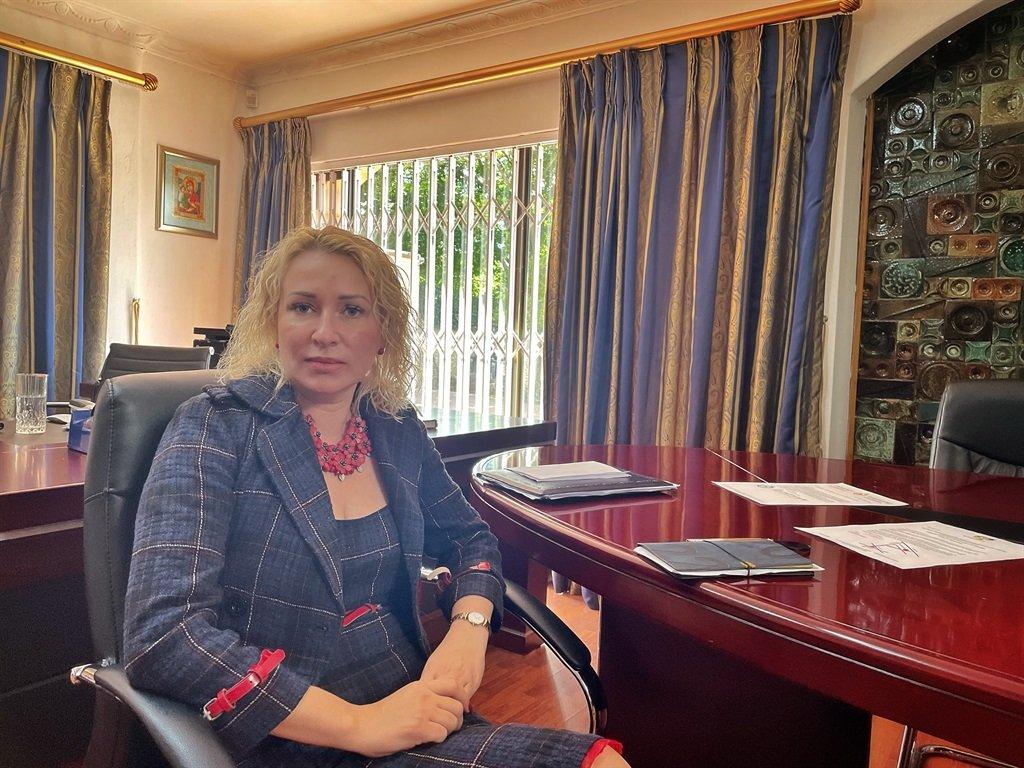Africa-Press – South-Africa. The hope is that the Ukrainian ambassador and Dirco have sorted out their diplomatic spat and re-established the principles of mutual respect, decorum and diplomatic conduct, writes University of Johannesburg Professor
Siphamandla Zondi.
On 10 April 2022, Ukraine’s ambassador to South Africa, Liubov Abravitova (@lubabravitova), took to Twitter to convey her dismay about the embassy’s failure to get an audience with South African ministers.
Abravitova tweeted:
Making clear who she wanted to reach, besides the divided SA population, she tagged the Department of International Relations and Cooperation (Dirco), President Cyril Ramaphosa, alongside media houses like News24, Daily Maverick, SABC News and eNCA.
This tweet attracted a near immediate response from a senior government official – Deputy Director-General for Public Diplomacy at Dirco, Mr Clayson Monyela. Monyela called Abravitova’s tweet undiplomatic, which in diplomatic language meant it was an improper way to communicate with the host government.
Monyela tweeted:
He tagged Deputy Minister Alvin Botes and Dirco’s official account in his tweet.
Monyela then revealed something a little further which suggests the ambassador was less than responsible.
“We’ve long made a request for HE C Ramaphosa to speak to your President. You’re not responding.”
He sought to convey that it was not that factually the ambassador had met officials, a deputy minister and a president’s advisor, but that South Africa had requested an audience with President Zelensky of Ukraine directly, which the ambassador had stalled on. It created the impression that the ambassador wanted to be one who, as an ambassador, met the South African president, perhaps because the Ukrainian President was too senior to meet a mere South African president.
Of course, the ambassador did not respond to these comments, which she triggered. Instead, it seemed that she receded back to secret diplomatic communication and traditional diplomacy.
A world on its own
Twitter is a world on its own, so nothing has to be taken at face value, except when it comes to accounts that are verified as belonging to officials like the ambassador and Monyela. Twitter diplomacy is a terrain of many possibilities, helping to demystify diplomacy and making it accessible to ordinary people. But it carries with it the risk of misinformation, disinformation and power games designed to serve narrow political purposes of this or that government.
ANALYSIS |
Ukraine: A peace deal will require mutual trust, which is very hard to imagine
There is clearly a huge information war happening around the Russia-Ukraine War. While it is uncertain as to who is winning the military war on the ground, it is clear who has the upper hand in the propaganda war. Russia may be holding out in the military conflict, which has a devastating impact on Ukraine’s infrastructure, economy and human lives, but it has already lost the propaganda war, in my view.
Ukraine’s propaganda, backed by the most powerful states in the world, has been successful in dominating world news. World news is actually western news, in our case, mainly coming through US and European news providers that have decided to believe and repeat anything Kyiv says, and not even hear what Moscow says.
Non-aligned position
This brouhaha elicited quite a debate and divided opinions on Ukraine, with some lambasting the South African government and others criticising Ukraine’s conduct, even though both sides share an opposition to the Russian war in Ukraine. It turned into a diplomatic spat on Twitter in a manner that revealed many fault lines in public diplomacy around the Russia-Ukraine war.
One fault line is that the war has become a scene of slander, misinformation and power games. Second is that public diplomacy via social media can divide public opinion and cause social disquiet. The third is that when diplomats publicly go on the offensive, they invite a retort and may even push countries away from their countries. Fourth is that South Africa’s non-aligned position on the war may be seen by both sides as aloofness. Lastly, Twitter diplomacy does help to open up a window into the state of diplomatic relations between countries, which is often hidden in the secret nature of most diplomatic communications.
ALSO READ |
Katja Keul and Niels Annen: Russia is using hunger as instrument of war
– Siphamandla Zondi is a professor of politics and international relations at the University of Johannesburg and is at the Institute for Pan-African Thought and Conversation.
To receive Opinions Weekly, sign up for the newsletter here
*Want to respond to the columnist? Send your letter or article to [email protected]
with your name and town or province. You are welcome to also send a profile picture. We encourage a diversity of voices and views in our readers’ submissions and reserve the right not to publish any and all submissions received.
For More News And Analysis About South-Africa Follow Africa-Press






